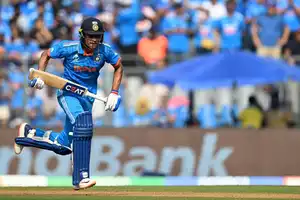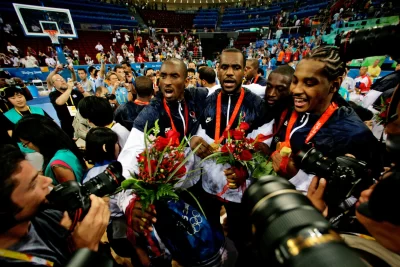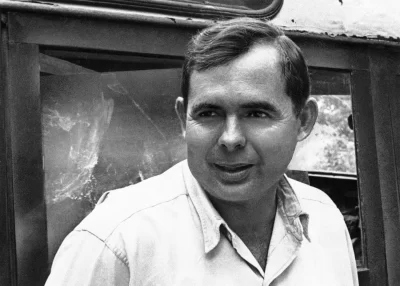
Did you see that Shubman Gill performance in Mumbai? It was easy to miss, right there in the middle of that century, that other 70-ball century, that tone-defining 40-something and that seven-fer. But there he was, all of 24, serenely still in the tumult of a World Cup semifinal pit, whether square-punching off the back-foot, or short arm-jabbing a fuller ball. Or while just being Gill: slight of frame, dark of brow beneath the helmet, all clean lines from start to finish.
And then he began cramping up and started annoying his hamstrings. He tried plonking himself on a chair, sitting under an umbrella drinking electrolyte water and stretching the entirety of his 1.85-metre frame. And when none of it worked, he retired back to the comforts of the dressing room with 79 from 65, leaving those last verses unwritten. Then the other things happened and India won.
It has been that kind of a World Cup for the latest entrant in India’s assembly line of batting prodigies. He came into this World Cup seriously threatening another of those Sachin Tendulkar records that no one thought would be threatened: the haul of 1894 ODI runs in a calendar year. But Gill’s aggregate of 350 runs from eight innings leave him some way off. For the record, he is 21st on the tournament’s run charts and only fifth in his own team, behind Virat Kohli, Rohit Sharma, Shreyas Iyer and KL Rahul.
He has not quite broken into an epochal ‘Here I am, this is me’ song that most thought he would, given the year he’s had, but those few stanzas here and there have been perfectly pitched and entrenched in nuance. In a side defined by role clarity and spurred on by illuminating lights, you’d have to inspect the shadows in between for those Gill contributions.
If you did go looking, they aren’t hard to find. Go backwards from that semifinal. When Rohit Sharma bolted away to 45 off 22 after six overs, Gill had 11 from 14, one of his two boundaries coming off a fortuitous inside edge. “He scores fours, he scores six, I just watch,” Gill joked later. But it’s what happened straight after Rohit was dismissed, attempting another big shot, that made for excellent viewing. In the next eight balls that he faced, Gill hit three fours. While Kohli went about his usual innings-building phase, Gill tore into Lockie Ferguson, slamming two fours followed by another four and a six in the speedster’s next over.
Any intentions Kane Williamson might have had of stringing in a sequence of quiet overs post-Rohit were immediately scattered, and the tactically astute New Zealand captain was forced to sift through bowling options and ends. Mitchell Santner is among the biggest defensive weapons in Williamson’s ranks and the left-arm spinner has had a particularly becalming effect on Kohli. But not Gill. When the run-rate dipped just under seven, Gill stepped down the pitch and launched one of those Santner floaters into the sight-screen, forcing a correction next ball which he chopped away past backward point.
This has been Gill’s modus operandi through the World Cup, to operate in those blanks: to play those ‘good shots’ and take percentage options while Rohit punctures opposition egos and Kohli runs them ragged. In Bengaluru, when Rohit briefly had his bat swing affected by Logan van Beek’s off-cutters and wore a couple of deliveries on his body, Gill took the Dutch bowler to shreds by hitting him for 4, 6 and 4 in a 16-run over.
In Pune, he took on the left-arm threat of Mustafizur Rahman and hit him for three fours in an over, just like he’d done to Shaheen Afridi in the Asia Cup. In Mumbai against Sri Lanka, when Kohli seemed to be slowing down in anticipation of the 49th hundred, Gill hit Dushmantha Chameera for the first six of the match and took down Dushan Hemantha in the following over to race past Kohli, before missing out on his own century by eight runs in an attempt to force the pace.
This is undeniably India’s most successful batter in the format this year and the fulcrum of the team’s line-up for years to come, who is now playing shrewd-stylish gatherer who ensures there’s enough in the stockpile so the hunters can run wild. Except, at this World Cup, there’s not been enough gathering for him while the rest of the hunters have nabbed more than their share of the game. His tournament began in unfortunate circumstances when he was laid low by Dengue, a viral disease that’s also known as breakbone fever because of the severity of the symptoms – chiefly muscle spasms and joint pain.
Gill missed the opener against Australia, was hospitalised in Chennai and left behind when the team went to Delhi to play Afghanistan. He rejoined the squad in Ahmedabad, unmistakably frail. Even after his captain declared him 99% available to play against Pakistan, Gill endured what’s likely to be one of the more stressful net sessions of his career. He batted for close to 40 minutes and when he was done, he simply slumped to the grass outside the nets with fatigue. An attempt to bat again lasted all of five minutes and needed one of the net bowlers to double up as a ‘keeper just to retrieve the balls that he played and missed.
He admitted after the New Zealand semi final that the loss of muscle mass had eaten into his energy reserves and that is the reason why he was cramping up earlier than he would in humid conditions, forcing him to retire ill. And yet, over the course of the World Cup Gill has grown stronger, in body and game, leading back to Ahmedabad.
On Sunday, Gill will be the youngest of the 22 expected to rise to the occasion. And yet no one, in either rank, can claim to match his CV at this biggest of venues in the cricketing world. He doesn’t even have to bat long, as his IPL record on this ground in this season would attest: 572 runs from nine games, including two hundreds and three fifties and a staggering strike-rate of 172.81.
In this year alone, Gill has the experience of playing a major final here as well as scoring a hundred against Australia. Then there is a small matter of playing and beating Australia in a World Cup final. No member of this Indian team can claim to have that experience with the exception of Gill. Having done so in the 2018 Under-19 World Cup, he fills that blank too.





